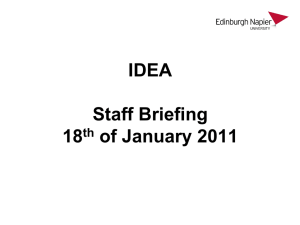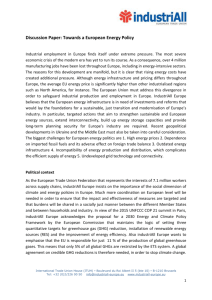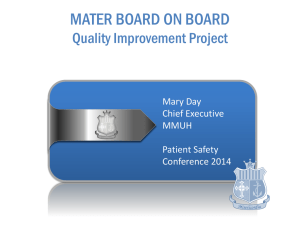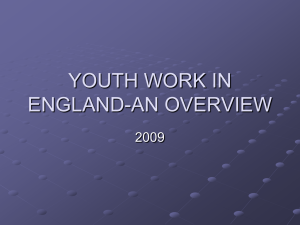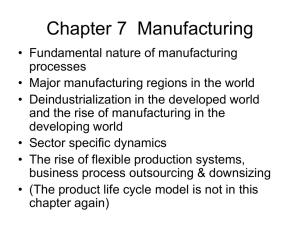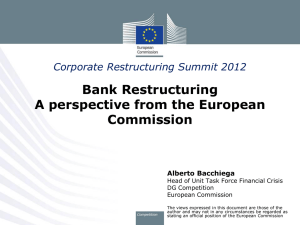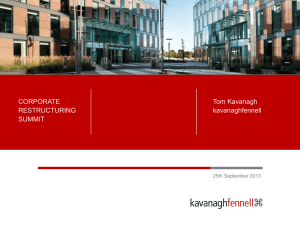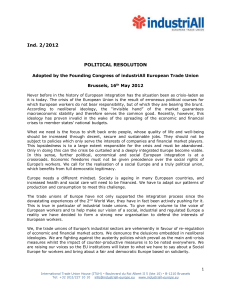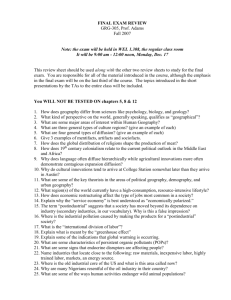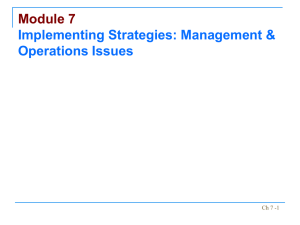Strengthening our capacity to anticipate and deal with change in
advertisement
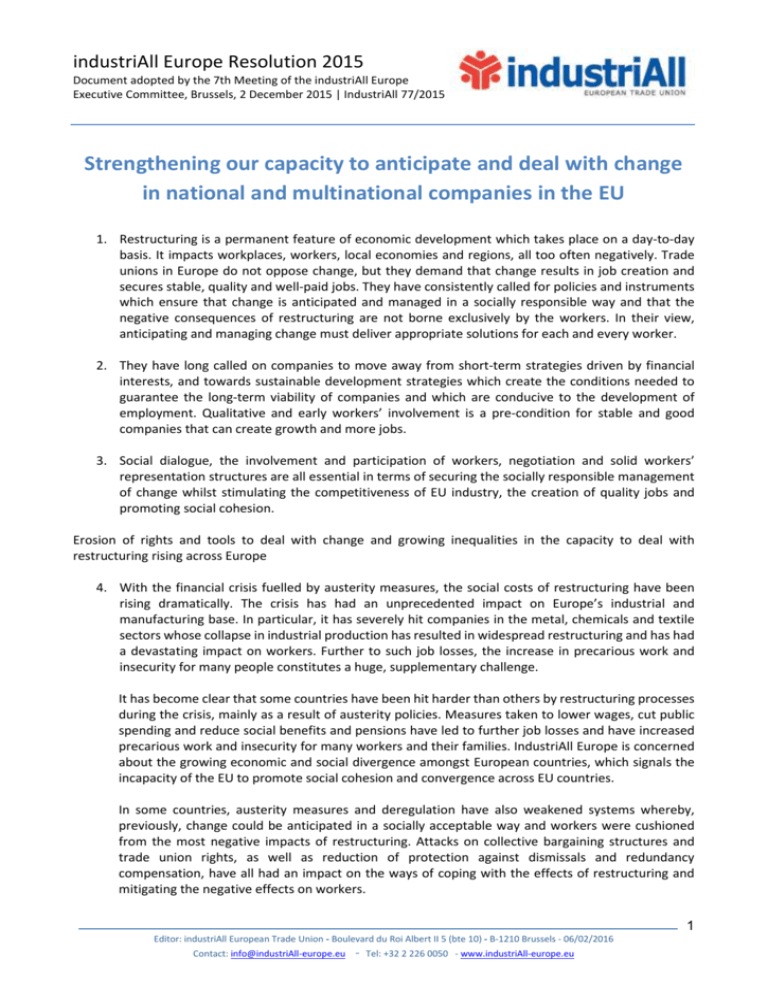
industriAll Europe Resolution 2015 Document adopted by the 7th Meeting of the industriAll Europe Executive Committee, Brussels, 2 December 2015 | IndustriAll 77/2015 Strengthening our capacity to anticipate and deal with change in national and multinational companies in the EU 1. Restructuring is a permanent feature of economic development which takes place on a day-to-day basis. It impacts workplaces, workers, local economies and regions, all too often negatively. Trade unions in Europe do not oppose change, but they demand that change results in job creation and secures stable, quality and well-paid jobs. They have consistently called for policies and instruments which ensure that change is anticipated and managed in a socially responsible way and that the negative consequences of restructuring are not borne exclusively by the workers. In their view, anticipating and managing change must deliver appropriate solutions for each and every worker. 2. They have long called on companies to move away from short-term strategies driven by financial interests, and towards sustainable development strategies which create the conditions needed to guarantee the long-term viability of companies and which are conducive to the development of employment. Qualitative and early workers’ involvement is a pre-condition for stable and good companies that can create growth and more jobs. 3. Social dialogue, the involvement and participation of workers, negotiation and solid workers’ representation structures are all essential in terms of securing the socially responsible management of change whilst stimulating the competitiveness of EU industry, the creation of quality jobs and promoting social cohesion. Erosion of rights and tools to deal with change and growing inequalities in the capacity to deal with restructuring rising across Europe 4. With the financial crisis fuelled by austerity measures, the social costs of restructuring have been rising dramatically. The crisis has had an unprecedented impact on Europe’s industrial and manufacturing base. In particular, it has severely hit companies in the metal, chemicals and textile sectors whose collapse in industrial production has resulted in widespread restructuring and has had a devastating impact on workers. Further to such job losses, the increase in precarious work and insecurity for many people constitutes a huge, supplementary challenge. It has become clear that some countries have been hit harder than others by restructuring processes during the crisis, mainly as a result of austerity policies. Measures taken to lower wages, cut public spending and reduce social benefits and pensions have led to further job losses and have increased precarious work and insecurity for many workers and their families. IndustriAll Europe is concerned about the growing economic and social divergence amongst European countries, which signals the incapacity of the EU to promote social cohesion and convergence across EU countries. In some countries, austerity measures and deregulation have also weakened systems whereby, previously, change could be anticipated in a socially acceptable way and workers were cushioned from the most negative impacts of restructuring. Attacks on collective bargaining structures and trade union rights, as well as reduction of protection against dismissals and redundancy compensation, have all had an impact on the ways of coping with the effects of restructuring and mitigating the negative effects on workers. 1 Editor: industriAll European Trade Union - Boulevard du Roi Albert II 5 (bte 10) - B-1210 Brussels - 06/02/2016 Contact: info@industriAll-europe.eu - Tel: +32 2 226 0050 - www.industriAll-europe.eu industriAll Europe Resolution 2015 As a result, we have seen increasing inequalities in the treatment of restructuring across Europe, with a number of countries in which the role of workers’ representatives and trade unions in influencing and negotiating change has been constantly undermined. At the same time, we have also seen the positive outcomes of stronger cooperation and well-established social dialogue in other countries. These inequalities are very much felt in European Works Councils (EWCs) in multinational companies which are undergoing transnational restructuring processes. 5. With the crisis, company collapses, restructuring processes and transfers of production have all stepped up the pressure on workers employed in the manufacturing industry throughout Europe. Company strategies lead to workers being played off against one another, exerting pressure to force further concessions, generating social dumping and precarious work, and undermining social and trade union rights. Furthermore, globalisation, fast-growing technological change due in particular to digitalisation and the domination of financial markets will all contribute to making today’s economy one of accelerating change. 6. This situation calls for urgent action at EU level. Policies need to be refocused on promoting growthoriented monetary and budgetary policies and more social justice. The EU-wide harmonisation of company taxation should be promoted in order to prevent tax avoidance and regime shopping. Social dialogue, autonomous collective bargaining power and better collective agreements, as well as effective workers’ information, consultation and participation rights, are all cornerstones in terms of contributing to a strong industrial base, delivering high-quality jobs and social cohesion. 7. Anticipation of change and socially responsible restructuring both rely on early and adequate information and consultation, as well as participation. Workers must be able to have a strong say in corporate strategy in order to defend workers’ interests and sustainable companies. They do not want to play a role exclusively in the management of the social consequences of restructuring. To achieve this, workers need to be involved in the day-to-day life of the company, fostering a more cooperative approach and the building of mutual trust. Workers must be informed and consulted to enable them to play an active role in the decision-making process including, where possible, at board level. They must have access to strategic information at a very early stage as well as the right to be supported by experts to analyse the information, flesh out their concerns and propose alternatives. 8. In multinational companies, EWCs are indeed the appropriate forum for employees and management to “promote an approach aimed at anticipating and managing change in a socially responsible manner”. However, from our experience with more than 550 EWCs, we see that workers’ involvement in restructuring cases is often a pure formality and has limited impact. Despite the fact that the Recast Directive 2009/38/EC on EWCs gives workers strengthened rights in the event of transnational company restructuring, all too often EWCs are still presented with a ‘fait accompli’. They are not informed and consulted with sufficient warning about planned company decisions. They have neither the time nor the means to make counterproposals or to work on alternative solutions for the announced restructuring plans. Furthermore, at national level, despite legal frameworks on information, consultation and participation, in some countries workers and their representatives still find it very difficult to play a proactive role in the anticipation and the management of change. In this respect the Directive 2002/14/EC establishing a general framework for informing and consulting employees in the European Community needs to be better enforced at national level and to be strengthened. New and strengthened instruments are urgently needed. 9. It is clear that in order to ensure that restructuring is handled in a socially responsible way, i.e. that no-one is left behind without socially acceptable solutions, existing instruments must be fully respected and enforced. Timely information, consultation and participation are essential but they 2 Editor: industriAll European Trade Union - Boulevard du Roi Albert II 5 (bte 10) - B-1210 Brussels - 06/02/2016 Contact: info@industriAll-europe.eu - Tel: +32 2 226 0050 - www.industriAll-europe.eu industriAll Europe Resolution 2015 are not sufficient. New and strengthened instruments need to be developed, both at national and European level. 10. Forward planning of employment and skills, workforce planning and the ongoing training and upgrading of workers’ skills are all cornerstones in terms of the anticipation of and preparation for changes within companies, as well as limiting any negative consequences they may have on employment. Lifelong learning must be actively promoted, both at national and EU level. The internal and external employability of each worker has to be strengthened and organised. Access to continuous training must be guaranteed for all workers, irrespective of their age and/or profession. 11. In the event of economic change which is likely to have an impact on employment, the priority is to ensure that alternative solutions to redundancy are actively sought. This might include temporary short time schemes, working time accounts, internal mobility, early retirement as well as external redeployment, tailor-made measures in the areas of career guidance, adequate training, active support in finding a new job or placement in another company, assistance in the creation of new activities and adequate social protection support during the unemployment and job search period. In this respect, industriAll Europe believes that minimum European standards must be promoted for avoiding redundancies. IndustriAll Europe also supports the initiatives taken by the European Commission to set up an optional European legal framework for transnational company agreements. Transnational negotiation i.e. the framework of transnational restructuring, should be made possible to result in a transnational company agreement with immediate effect on all covered workers. This legal framework must respect the bargaining competences of trade unions. 12. IndustriAll Europe is in favour of strengthening existing EU instruments or developing new ones in order to effectively prepare and enable workers to anticipate change and, on the other hand, to promote support mechanisms which cushion workers from the negative impacts of economic change in particular dismissals. 13. While the European Commission consistently tries to question and undermine workers’ involvement, which it sees as a potential burden to businesses rather than as an essential and stable element for sustainable corporate governance, industriAll Europe calls for the establishment of ambitious standards on workers’ information and consultation rights as well as on European board-level representation. In this respect, we support the ETUC’s demand for a Directive introducing a new and integrated architecture for workers’ involvement combining the establishment of highest standards on information and consultation with the introduction of new, ambitious standards on workers’ board-level representation as an additional source of workers’ influence. 14. The European Commission has long recognised the problems of restructuring and the negative consequences of this on workers, their families and the local economies and has accumulated many good practices. However, so far it has failed to propose a legal instrument on anticipating and managing change. It also gave a very poor and unsatisfactory response to the Cercas report adopted by the European Parliament in early 2013, with the adoption at the end of 2013 of a “Quality Framework for Anticipation of Change and Restructuring”. The Commission’s lack of ambition is likely to cause frustrations as European workers and their representatives are increasingly experiencing change and the severe effects of restructuring. 15. Company restructuring has been taking place in a social vacuum at EU level for too long. While companies are increasingly able to enjoy the incoherent EU acquis and organise their corporate structure in order to pick and choose the most “company friendly” national legislation, workers see their rights eroded and precarious work and insecurity growing. Moreover, increasing economic and 3 Editor: industriAll European Trade Union - Boulevard du Roi Albert II 5 (bte 10) - B-1210 Brussels - 06/02/2016 Contact: info@industriAll-europe.eu - Tel: +32 2 226 0050 - www.industriAll-europe.eu industriAll Europe Resolution 2015 social divergence throughout Europe cannot be the blueprint for the future of Europe. A Europe based on internal competition between national social legislation and where workers are put in competition against each other is not a Europe that will deserve a triple-A rating as Commission President Juncker stated in October 2014, nor will it bring Europe closer to its citizens and workers. Urgent action is therefore needed! IndustriAll Europe calls for: The promotion of ambitious lifelong-learning policies enabling citizens and workers to be able to adapt to change. Access to ongoing training must be guaranteed for all workers, irrespective of their age and/or profession. This must be underpinned by an individual worker’s right to training, preferably guaranteed by collective agreements. Companies, sectors and education systems also have to address the issue of the anticipation of skills needs, the upgrading of existing skills as well as the validation and recognition of skills. A strengthening of information and consultation rights at national level, through in particular a better enforcement of the measures transposing the Directive 2002/14/EC, and the promotion of a genuine anticipation agenda based on a model of corporate governance in which workers are involved in strategic decisions at a very early stage. In view of the revision of the EWC Recast Directive, the European Commission should make appropriate proposals to improve information and consultation rights at European level i.e. ensuring that workers have a stronger voice with regard to company strategic issues such as investments, innovation and production, but also to the consequences of these strategic decisions for employment and employee training policies. Such an anticipation agenda demands that social consequences of planned strategic decisions are communicated at a very early stage. The possibility for workers’ representatives to be assisted by experts should be given. In addition, effective and dissuasive sanctions must be put in place. The adoption of a Directive introducing a new and integrated architecture for workers’ involvement, combining the establishment of highest standards on information and consultation with the introduction of new, ambitious standards on workers’ board-level representation as an additional source of workers’ influence (as requested by the ETUC). A strengthening of national collective bargaining systems and social dialogue structures and the setting-up of an optional European legal framework for transnational company agreements which respects the bargaining competences of the trade unions. A binding legal initiative taken by the European Commission to give an adequate and effective response to the challenges raised by the Cercas report on anticipation of change. Anticipation and management of change has been on the European agenda for years, and should now result in binding policies. Timely anticipation and preparation is key to preventing and/or limiting the negative impact of restructuring on workers as well as on local and regional economies. Information has to be communicated at the earliest possible time allowing adequate preparation for support measures. Timeframes to inform workers should be extended whether these information rights are regulated by law or by collective agreements. The timeframe to notify public authorities could also be extended. 4 Editor: industriAll European Trade Union - Boulevard du Roi Albert II 5 (bte 10) - B-1210 Brussels - 06/02/2016 Contact: info@industriAll-europe.eu - Tel: +32 2 226 0050 - www.industriAll-europe.eu industriAll Europe Resolution 2015 Ensuring that alternatives to redundancies are actively sought and found, be they guaranteed by law or by collective agreement. Workers who are negatively affected by economic change must have access to similar support mechanisms and social protection throughout Europe to maintain their internal and external employability. Measures to mitigate the social costs shall address the following issues: • right to training and to retraining; • voluntary redundancies; • right to employment supported by active labour market policies; • psychological assistance; • internal and external redeployment including the possibility to develop one’s own business. 5 Editor: industriAll European Trade Union - Boulevard du Roi Albert II 5 (bte 10) - B-1210 Brussels - 06/02/2016 Contact: info@industriAll-europe.eu - Tel: +32 2 226 0050 - www.industriAll-europe.eu
